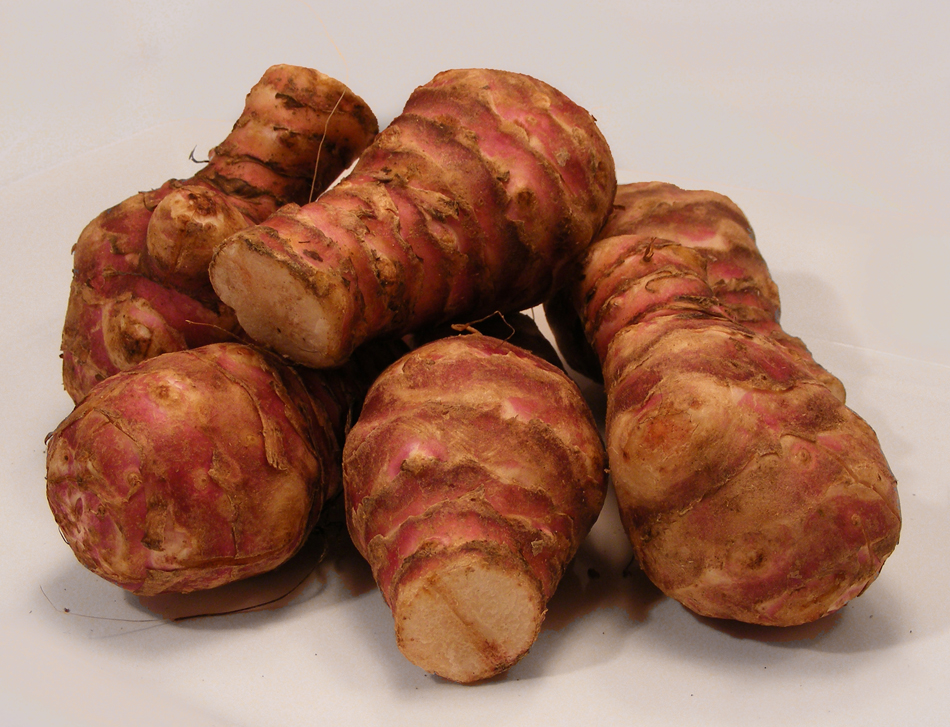You know it as Jerusalem artichoke, but this tuber has origins that have nothing to do with Jerusalem.
The Jerusalem artichoke, an herbaceous perennial plant with an underground bulb, also known as Jerusalem artichoke, has a rather controversial etymology, as it is not an artichoke, it does not come from Jerusalem and it has no connection with the Brazilian tribe of Tupinamba. Let’s find out more about this tuber that comes with an extensive array of properties and nutritional values.
Origin and History of Jerusalem Artichoke
The Jerusalem artichoke is a species of sunflower that can exceed 3 meters in height and is cultivated for its edible underground tuber. It was discovered by the French explorer Samuel de Champlain in what is now Massachusetts, where the roots of the plant were cultivated by the native populations and had, according to Champlain, a flavor reminiscent of the artichoke.
The plant was first introduced to the French courts on the same day that a tribe of Indians from Brazil, the Tupinamba, came to France. The French mistakenly thought that it was the natives who had brought this mysterious tuber to Europe, so they decided to call it by the same French name that they later gave to the natives: “Topinambours”.
The plant was called girasol or sunflower (respectively from the homonymous words of the Spanish and Italian language) because of its resemblance to the famous yellow flower, but the plant also had this tuber in the roots that tasted like an artichoke.
For this reason, some scholars believe the name is an English corruption of the Italian “girasole articiocco” (in many northern Italian dialects, the artichoke is actually called “articiocco”). Another common name for Jerusalem artichokes is sunchoke, coined in the 1960s by Frieda Rapoport Caplan, an American businesswoman who decided the plant needed a catchier name to boost sales. Over the years, the name stuck and no one bothered to correct it.
Despite its incorrect names, the Jerusalem artichoke tuber is easily found in supermarkets, produce stores and farmers’ markets, can be baked, fried, steamed and contains good amounts of minerals (especially potassium and iron) and vitamins A and C.
Properties and Nutritional Values of the Jerusalem Artichoke
Let’s discover the properties and nutritional values of Jerusalem artichoke.
Like all plant foods, Jerusalem artichokes do not contain cholesterol. 100 grams of cooked Jerusalem artichoke provide our body with 2.7 grams of fiber. We can consume cooked Jerusalem artichoke if we want to enrich our diet with plant fiber that contributes to the proper functioning of the intestine.
Eating raw Jerusalem artichoke, on the other hand, keeps its vitamin and mineral content intact. Below, is a table with the nutritional values corresponding to 100 grams of fresh and raw Jerusalem artichoke.
- – Energy 73 Kcal
- – Carbohydrates 17.44 g
- – Protein 2 g
- – Total fat 0,01 g
- – Cholesterol 0 mg
- – Fiber 1,6 g
- – Folate 13 µg
- – Niacin 1,3 mg
- – Pantothenic acid 0,397 mg
- – Pyridoxine 0.07 mg
- – Riboflavin 0.060 mg
- – Thiamine 0.200 mg
- – Vitamin A 20 IU
- – Vitamin C 4 mg
- – Vitamin E 0.19 mg
- – Vitamin K 0,1 µg
- – Sodium 4 mg
- – Potassium 429 mg
- – Calcium 14 mg
- – Copper 0,140 mg
- – Iron 3,40 mg
- – Magnesium 17 mg
- – Manganese 0.060 mg
- – Selenium 0,7 µg
Thus we find that raw Jerusalem artichoke is rich in potassium. 100 grams of raw Jerusalem artichoke contain 429 mg of potassium and also provide 4 mg of sodium, 4 mg of vitamin C, 14 mg of calcium, 17 mg of magnesium and small amounts of zinc, iron, copper, selenium, vitamin E, vitamin A and manganese.
Benefits of the Jerusalem Artichoke
The consumption of Jerusalem artichoke is indicated above all to enrich our diet with fiber, antioxidants, vitamins and minerals, with particular reference to raw Jerusalem artichoke. Jerusalem artichoke contains soluble and insoluble fiber. An adequate intake of fiber in the diet helps reduce constipation problems and promotes the proper functioning of the intestine.
Jerusalem artichoke contains small amounts of antioxidant substances, such as vitamin A, vitamin C and vitamin E. These substances, as well as flavonoids and carotenoids, help to counteract the action of free radicals and protect us from inflammation and viral forms such as the flu and colds.
In addition, Jerusalem artichoke helps us to enrich our diet with iron and folate. Don’t forget that folate is very important during pregnancy to avoid malformations in the baby that will be born. If a pregnant woman’s diet is low in folate, she may need to modify it and/or take a folic acid supplement.
Let’s summarize the properties and benefits of Jerusalem artichoke:
- – Detoxifying
- – Gluten-free
- – High protein content
- – Fights anemia
- – Reduces blood sugar levels
- – Fights stress and fatigue
- – It increases the immune system
- – Accelerates the metabolism
- – Against constipation
There you go! Are you going to consume more of this tuber now to enjoy better health? Let us know of your thoughts in the comments below.


